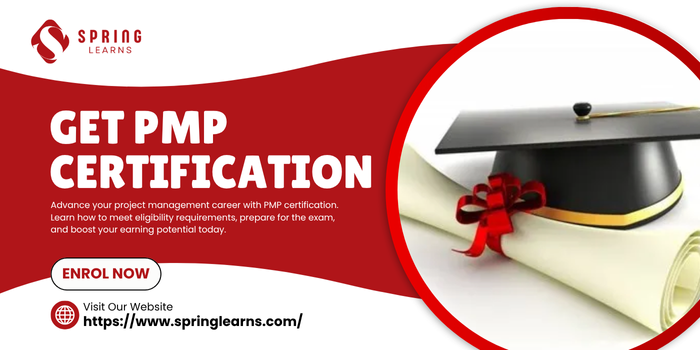
How To Get A PMP Certification?
Thinking about boosting your project management career? Then you've probably heard about PMP Certification. It's one of the most respected project management credentials globally. But if you're like many professionals, figuring out how to get PMP Certification can feel overwhelming.
From understanding eligibility to choosing the right PMP course and scheduling your exam, the process includes several important steps. And without proper guidance, it's easy to feel stuck or unsure of where to begin.
This guide walks you through the complete journey. You'll discover everything you need to know to pursue, prepare for, and successfully earn your PMP Certification. Let's take it one step at a time.
What Is PMP Certification?
PMP (Project Management Professional) Certification is a globally recognized credential offered by the Project Management Institute (PMI). It certifies your ability to manage projects efficiently, covering areas like planning, execution, monitoring, control, and closure.
The PMP framework is based on three key domains:
Holding a PMP Certification shows that you have the knowledge and practical experience needed to lead and deliver successful projects regardless of industry or location.
Why Should You Obtain PMP Certification?
There are several reasons why professionals across industries pursue the PMP Certification:
PMP-certified professionals are highly sought after. Organizations value the PMP credential as proof of leadership, dedication, and project management excellence. This often leads to promotions, more responsibility, or better job prospects.
PMI's Salary Survey reports that PMP-certified project managers earn 20–25% more than their non-certified peers. That's a significant increase well worth the time and effort it takes to get PMP Certification.
Whether you work in IT, construction, healthcare, or finance, PMP Certification is universally accepted. It opens the door to international opportunities and demonstrates that you meet global standards in project management.
Getting PMP Certification reflects a commitment to continuous learning and excellence. It sets you apart as someone who can handle complex project demands, manage cross-functional teams, and drive business outcomes.
How Do You Enroll In A PMP Course?
To qualify for the PMP exam, you need 35 hours of formal project management education. This is where the PMP course comes in. Here's how to enroll:
Step 1: Find A PMI-authorized training Provider
Choose a provider listed on PMI's website or one that explicitly states they're PMI-authorized. This ensures the course content aligns with PMI's standards and covers the exam domains in detail.
Step 2: Select Your Learning Format
You can choose from various course formats depending on your schedule and learning style:
Each PMP course should include recorded lectures, study guides, quizzes, and mock exams.
Step 3: Enroll And Begin Learning
Once enrolled, you'll start working through the course material, which typically includes:
You must complete all 35 hours to become eligible for the PMP exam.
Where Can You Find The Best PMP Courses?
Choosing the right PMP course is crucial. Here are some top platforms that offer excellent training:
PMI collaborates with Authorized Training Partners (ATPs) to deliver courses aligned with the current PMP Exam Content Outline. You can find ATPs on PMI's official website.
Both platforms offer PMP Certification courses from accredited institutions. These are ideal if you prefer a structured university-style format.
A popular choice, Simplilearn offers both self-paced and instructor-led courses with 24/7 support, study materials, and exam simulators.
A more affordable option, Udemy features several PMP courses. However, make sure the course meets the 35-hour requirement and is from a reputable instructor.
It offers courses by certified professionals. These are ideal for brushing up, though you may need additional training to meet the full 35-hour prerequisite.
Pro Tip: Always check reviews, curriculum coverage, instructor credentials, and included resources before purchasing a PMP Certification course.
When Should You Start Preparing For PMP Certification?
The best time to start is right after confirming eligibility. On average, most candidates take about 2 to 3 months to prepare for the PMP exam. However, this can vary based on your experience and available study time.
Create A Personalized Study Plan
Starting early allows you to avoid burnout and ensures a deeper understanding. You'll also have enough time to revisit difficult topics and clarify concepts.
Who Is Eligible For The PMP Certification?
Not everyone can jump into the PMP Certification process. You need to meet education and work experience requirements, which fall into two categories:
Option 1: Four-year Degree
Option 2: High School Diploma Or Associate Degree
Additional Notes:
Conclusion
Getting PMP Certification can feel like a big step, but it's a worthwhile investment in your professional growth. From understanding the exam requirements to enrolling in a top-rated PMP course, every action you take brings you closer to being recognized as a leader in your field.
By choosing the right resources and preparing effectively, you'll position yourself for success. Once you earn the credential, you'll unlock better career opportunities, global recognition, and a stronger earning potential.
So, if you're ready to get certified, now is the perfect time to start. Join the PMP Certification course today!
Frequently Asked Questions (FAQs)
How Long Is PMP Certification Valid?
Your PMP Certification is valid for three years. You can renew it by earning 60 professional development units (PDUs) during that time.
Can I Take The PMP Exam Online?
Yes, PMI offers an online proctored exam that you can take from the comfort of your home, with strict monitoring.
What Study Materials Should I Use For PMP Prep?
Use the PMBOK® Guide, Agile Practice Guide, your PMP course materials, and reputable mock tests like those from Rita Mulcahy or PMI's simulator.
How Many Questions Are On The PMP Exam?
There are 180 questions, which must be completed in 230 minutes. The questions include multiple-choice, drag-and-drop, and matching types.
What Happens If I Fail The PMP Exam?
You have three attempts within one year of your application approval. You'll receive feedback to focus on your weaker areas for your next attempt.